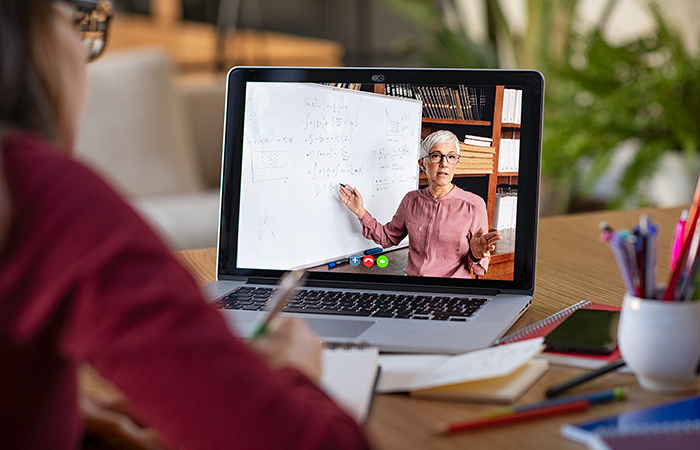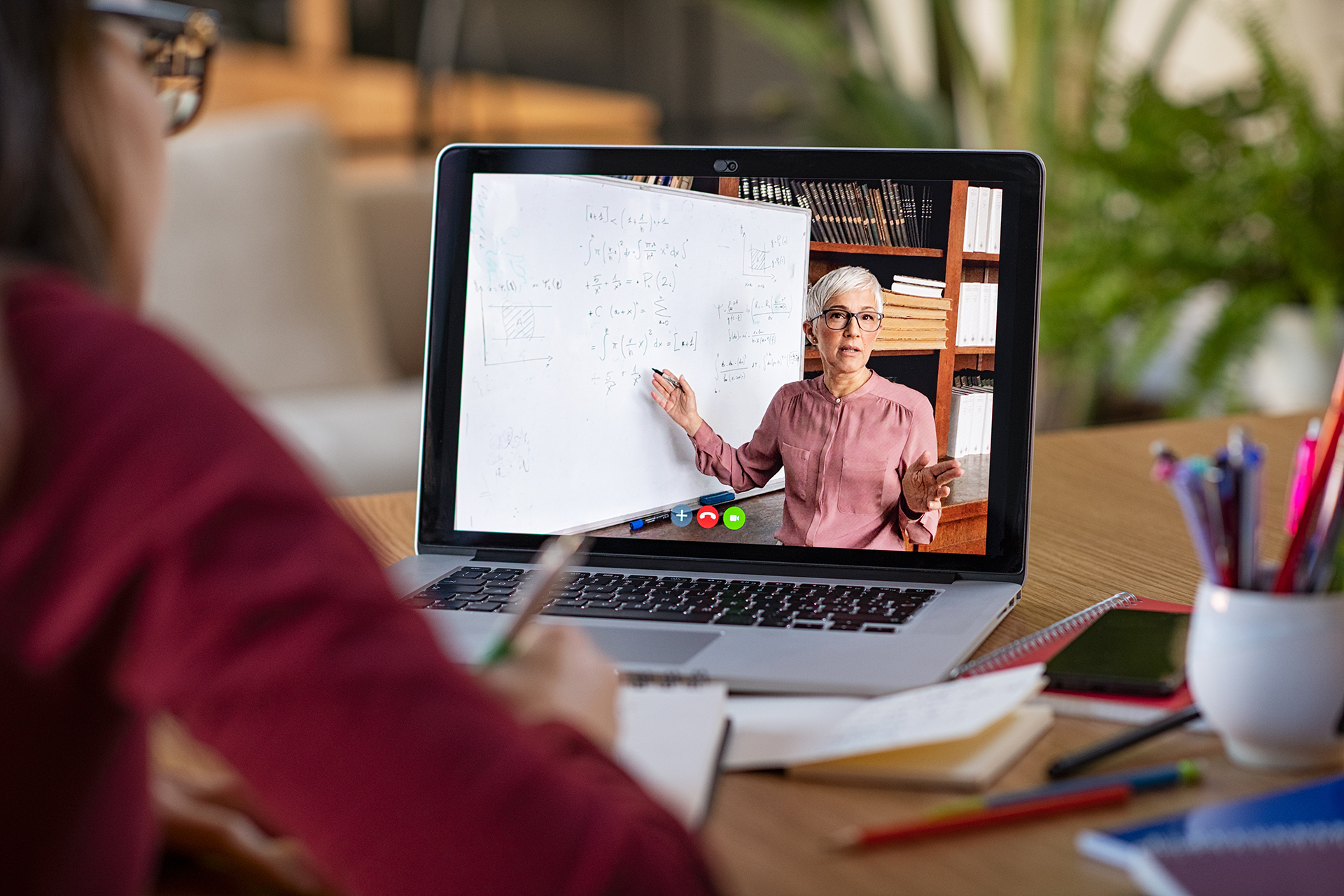Zooming into the Future
Innovative strategies like the “flipped classroom” are well-suited to a virtual learning environment
By Richard Westlund

Shifting gears in a high-performance sports car is easy. Just push in the clutch, move the stick, let up on the clutch and away you go. For a medical school with 800 students taking classes across three South Florida counties, the process is considerably more challenging.
But the University of Miami Miller School of Medicine made a remarkably smooth shift to online learning this spring in response to the COVID-19 coronavirus outbreak. It took only two weeks to deploy the Zoom videoconferencing platform after the University of Miami made the difficult decision on Friday, March 13, to end face-to-face classes for the semester.
Fortunately, the Miller School faculty and students were well prepared for the transition to remote learning.
“It was impressive how quickly the school was able to transform the curriculum this spring,” said third-year student Alexa G. Turpin. “Now, we are all learning in this new online environment.”
What’s missing, though, is the face-to-face interaction with patients in clinical settings — an essential aspect of the learning process that had to be put on hold this spring.
“We have lost the opportunity to practice our clinical skills in the hospital for now,” said first-year student Alison Ohringer, MS1 class president. “But Zoom is an excellent tool for learning in the big first-year classes. You can raise your hand to speak, type questions for the professor and private-message your classmates.”
Making the shift
In many ways, the Miller School was well prepared for the shift to online learning. Innovative strategies like the “flipped classroom,” whereby students study material in advance and respond to an instructor’s questions, are well-suited to a virtual learning environment. For example, basic physiology of the heart and circulatory system has been taught for several years via videos produced by the school’s faculty.
“Our staff has been very accustomed to online learning for years,” said Alex J. Mechaber, M.D. ’94, professor of medicine senior associate dean for undergraduate medical education and the Bernard J. Fogel Chair in Medical Education. “We have taken videos of all lectures in years one and two of the curriculum since 1999, and we have a dedicated group of IT staff on hand to help the faculty with this transition.”
While Miller School students are accustomed to videoconferencing on their mobile devices, not everyone had access to web cameras and high-speed connections at their homes. Therefore, the school’s computer laboratory and Calder Library remained open to accommodate South Florida students taking their exams, said Dr. Mechaber.
It was a bigger challenge bringing the faculty — with their varying degrees of technology proficiency — up to speed on the Zoom platform, according to Richard L. Riley, Ph.D., professor of microbiology and immunology, associate dean for preclinical medical curriculum and director of curriculum, M.D./M.P.H. program.
“The transition of pre-clerkship MS1 and MS2 medical school learning has been both challenging and gratifying,” Dr. Riley said. “Our faculty quickly learned and implemented both lectures and small group sessions using Zoom. Our archived videos were a great help, as well. We have used them in the past during emergency situations such as hurricanes. Overall, the proportion of lectures given ‘live’ via Zoom varies among courses, but the majority of lectures to date have been pre-recorded. As we go forward and gain experience, the frequency of live lectures will increase.”
Engaging the students
Along with course content, the Miller School’s education leaders are adapting new strategies for engaging students in remote settings. For instance, the use of Zoom breakout rooms to discuss cases and polling features have enhanced interaction between faculty and students, according to Gauri Agarwal, M.D., associate dean for clinical curriculum.
“Our students in the middle of their clinical training are learning about taking a patient’s history and building communication skills using a videoconferencing platform,” Dr. Agarwal said. “Standardized patients who are provided with scripts can interact with students through this remote platform and allow them to practice these skills. Nothing can replace the ability to perform a physical exam, but we can replicate many components of a clinical encounter.”
Telehealth technology is also opening the door to other types of ‘face-to-face’ learning experiences. “We piloted a clinic session with a faculty member and one of their patients that was conducted via Zoom for Healthcare,” Dr. Agarwal said. “The patient enjoyed interacting with the student, the student was able to practice history taking and communication skills, and the faculty member was able to debrief with the student and teach a clinical pearl.”
For students taking courses at the Miller School’s regional medical campuses in Broward and Palm Beach Counties, telehealth applications can save travel time while facilitating learning, according to Sarah Bland, M.D., director of the Integrated Medicine Clerkship.
“Clinical clerkships are all about patient interactions,” Dr. Bland said. “Telehealth can’t fully replace those clinical experiences, but technology has facilitated this new style of learning in a way that wouldn’t have been possible when I was in medical school.”
Looking Ahead
Adopting video conferencing and telehealth technology this spring may help the Miller School implement the NextGenMD curriculum in August. Rather than relying on large lecture-based classes for the first two years of medical school, the new curriculum calls for more small-group and team-based collaborative learning opportunities using clinical cases.
“Now we are thinking about how these new virtual learning technologies can best be incorporated next fall,” Dr. Bland said. “While no one would have chosen to onboard these platforms during a public health crisis, we now have an opportunity to see what will work over the long term.”
Meanwhile, both faculty members and students are looking forward to the resumption of clinical experiences.
“I was looking forward to my psychiatry rotation in a hospital or clinic setting,” said Jared Silberlust, a third-year student in the M.D./M.P.H program. “Now, we are using this time to complete our non-clinical coursework, including essays, practice questions, and exams. When it’s possible to return to clinical experiences, we will have a two-week session of seeing patients every day. That’s a great solution, giving us continuity in our clinical experiences.”
Reflecting on the Miller School’s journey, Dr. Mechaber applauded the hard work of the deans, faculty, and staff in getting the online learning platform up and running so quickly, and the ability of students to embrace the changes.
“The COVID-19 crisis has brought us all together, and that powerful sense of community will be one of the lasting benefits for our medical school,” he said.



